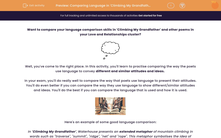Want to compare your language comparison skills in 'Climbing My Grandfather' and other poems in your Love and Relationships cluster?

Well, you've come to the right place. In this activity, you'll learn to practise comparing the way the poets use language to convey different and similar attitudes and ideas.
In your exam, you'll do really well to compare the way that poets use language to present their attitudes. You'll do even better if you can compare the way they use language to show different/similar attitudes and ideas. You'll do the best if you can compare the language that is used and how it is used.

Here's an example of some good language comparison:
In 'Climbing My Grandfather', Waterhouse presents an extended metaphor of mountain climbing in words such as "traverse", "summit", "ridge", "net" and "rope". This metaphor symbolises the idea of emotional connection between the speaker and his grandfather through the physical act of climbing the grandfather. 'Sonnet 29' also uses extended metaphor, but very differently. The speaker is comparing her romantic and sexual love for her lover through the metaphor of nature, "my thoughts do twine and bud" and "rustle thy boughs and set thy trunk all bare" which conveys sexual love through natural imagery.
You should always refer to your own text when working through these examples. These quotations are for reference only.








